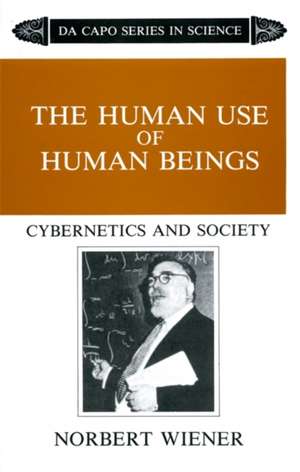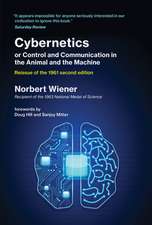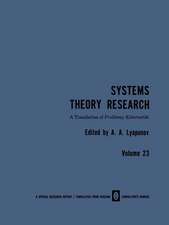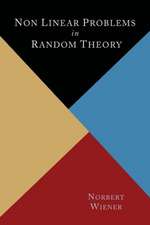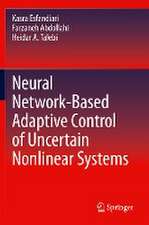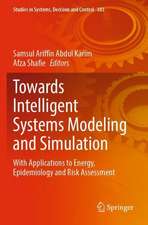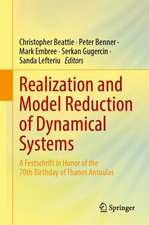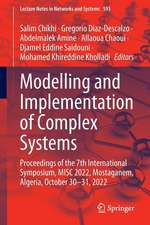The Human Use Of Human Beings: Cybernetics And Society
Autor Norbert Wieneren Limba Engleză Paperback – 21 mar 1988
Only
a
few
books
stand
as
landmarks
in
social
and
scientific
upheaval.
Norbert
Wiener's
classic
is
one
in
that
small
company.
Founder
of
the
science
of
cybernetics—the
study
of
the
relationship
between
computers
and
the
human
nervous
system—Wiener
was
widely
misunderstood
as
one
who
advocated
the
automation
of
human
life.
As
this
book
reveals,
his
vision
was
much
more
complex
and
interesting.
He
hoped
that
machines
would
release
people
from
relentless
and
repetitive
drudgery
in
order
to
achieve
more
creative
pursuits.
At
the
same
time
he
realized
the
danger
of
dehumanizing
and
displacement.
His
book
examines
the
implications
of
cybernetics
for
education,
law,
language,
science,
technology,
as
he
anticipates
the
enormous
impact—in
effect,
a
third
industrial
revolution—that
the
computer
has
had
on
our
lives.
Preț: 61.76 lei
Preț vechi: 81.90 lei
-25% Nou
Puncte Express: 93
Preț estimativ în valută:
11.82€ • 12.36$ • 9.82£
11.82€ • 12.36$ • 9.82£
Carte disponibilă
Livrare economică 12-26 martie
Livrare express 26 februarie-04 martie pentru 39.47 lei
Preluare comenzi: 021 569.72.76
Specificații
ISBN-13: 9780306803208
ISBN-10: 0306803208
Pagini: 200
Dimensiuni: 138 x 214 x 18 mm
Greutate: 0.23 kg
Ediția:Revised
Editura: Hachette Book Group
Colecția Da Capo Press
Locul publicării:United States
ISBN-10: 0306803208
Pagini: 200
Dimensiuni: 138 x 214 x 18 mm
Greutate: 0.23 kg
Ediția:Revised
Editura: Hachette Book Group
Colecția Da Capo Press
Locul publicării:United States
Notă biografică
Norbert Wiener received his Ph.D. from Harvard at the age of eighteen, and joined the mathematics department at M.I.T. when he was twenty-five. Honored throughout his life with numerous scientific awards, he was the author of two autobiographies, Ex-Prodogy and I Am a Mathematician, as well as several important books and basic papers on the theory and practice of cybernetics.
Descriere
Only a few books stand as landmarks in social and scientific upheaval. Norbert Wiener's classic is one in that small company. Founder of the science of cybernetics—the study of the relationship between computers and the human nervous system—Wiener was widely misunderstood as one who advocated the automation of human life. As this book reveals, his vision was much more complex and interesting. He hoped that machines would release people from relentless and repetitive drudgery in order to achieve more creative pursuits. At the same time he realized the danger of dehumanizing and displacement. His book examines the implications of cybernetics for education, law, language, science, technology, as he anticipates the enormous impact—in effect, a third industrial revolution—that the computer has had on our lives.
